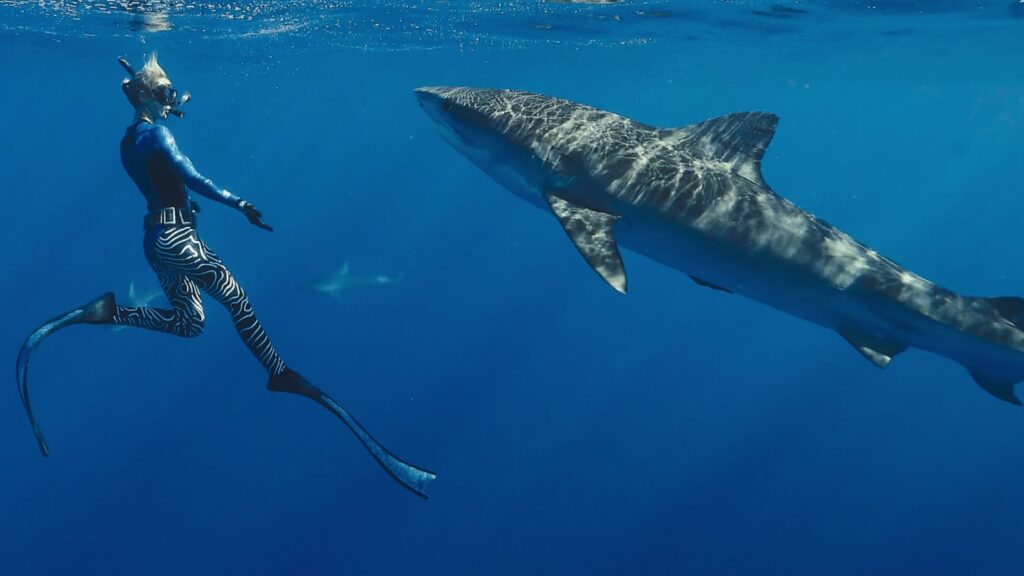
Netflix, often seen as the dominant predator in the streaming world, is diving into the shark-infested waters traditionally occupied by Discovery Channel and National Geographic. This summer, Netflix is making waves with its own shark-themed content, challenging established programs like Discovery’s Shark Week and Nat Geo’s SharkFest.
This holiday weekend marks the debut of National Geographic Channel’s 13th annual SharkFest, which precedes Discovery Channel’s 37th Shark Week. However, Netflix has already made a splash with its documentary Shark Whisperer, which premiered on June 30. The film follows Ocean Ramsey, known for her controversial approach to marine conservation, as she swims freely with sharks. Directed by James Reed, the Oscar-winning filmmaker behind My Octopus Teacher, the documentary has consistently been among Netflix’s top 10 films since its release.
Netflix’s Bold Move into Shark Programming
Netflix’s foray into shark content doesn’t stop with Shark Whisperer. On July 4, the streaming giant launched All the Sharks, a competition series where teams of shark experts race to photograph the most shark species within a set timeframe. The winning team earns $50,000 for their chosen marine charity. This aggressive entry into shark programming could leave audiences saturated before SharkFest even begins.
The timing of these releases coincides with the 50th anniversary of the iconic film Jaws, which premiered on June 20, 1975. This milestone has already spurred a wave of shark-related content, raising questions about audience fatigue. Nevertheless, Nat Geo is betting on the enduring appeal of sharks with 25 hours of new programming, including Jaws @ 50: The Definitive Inside Story, a documentary authorized by Steven Spielberg’s Amblin Entertainment.
The Legacy of Jaws and Its Impact
Jaws @ 50 promises to delve into the making of the film that launched the summer blockbuster phenomenon and influenced shark conservation efforts. Despite its cultural significance, Ocean Ramsey, the star of Shark Whisperer, argues that such films have contributed to the sensationalism surrounding sharks. In an interview, she expressed her gratitude to Netflix for offering a platform to portray sharks more accurately and promote marine conservation.
“It doesn’t really help that a lot of mainstream, traditional media has dramatized and sensationalized sharks because Jaws was, you know, a Hollywood-blockbuster kind of film,” Ramsey told THR.
Ramsey’s comments highlight a broader debate about the portrayal of sharks in media. While some programs focus on the dangers sharks pose, others, like Shark Whisperer, aim to educate audiences about their critical role in marine ecosystems.
SharkFest vs. Shark Week: A Battle for Viewers
SharkFest 2025, with its extensive lineup, aims to provide a scientific perspective on sharks, featuring insights from leading experts. Janet Han Vissering, senior vice president of development and production at Nat Geo, emphasized the network’s commitment to factual programming.
“SharkFest puts sharks where they belong — at the center of every story. We work hand-in-fin with leading experts to capture breakthrough research, rare behaviors, and untold perspectives,” Vissering stated.
Meanwhile, Discovery’s Shark Week continues to draw viewers with its mix of entertainment and education. Last year, the event attracted 25 million viewers, maintaining its status as a cultural phenomenon. This year’s highlights include Dancing With Sharks and Jaws vs Mega Croc, programs that blend spectacle with scientific inquiry.
The Future of Shark Programming
As Netflix enters the fray, the competition between streaming platforms and traditional networks is intensifying. The global reach of Netflix could potentially shift audience preferences, as viewers seek content that balances entertainment with education. Ocean Ramsey’s collaboration with Netflix exemplifies this trend, offering a fresh perspective on shark conservation.
Looking ahead, the challenge for networks and streaming services will be to engage audiences with innovative programming that respects the complexity of marine life. As the appetite for shark content continues to grow, the industry must navigate the fine line between sensationalism and science.
Ultimately, the success of these programs will depend on their ability to captivate viewers while fostering a deeper understanding of sharks and their ecosystems. With Netflix’s bold entry into shark programming, the waters are indeed churning with new possibilities.







